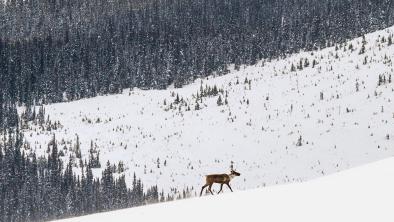Landmark court decision backs first nation's concern about caribou
Vancouver Sun

The B.C. Supreme Court has done what the provincial government would not: It has halted work on a coal mine project because of a first nation's concerns about a threatened caribou herd.
The court ruled that the B.C. government failed to sufficiently consult with the West Moberly First Nation or accommodate its concerns over destruction of critical caribou habitat near Chetwynd.
The ruling, dated last Friday, was released Tuesday by the first nation.
Justice L. Paul Williamson ordered a 90-day stay of First Coal Corporation's advanced exploration program to "permit and to mandate a proper accommodation of West Moberly's concerns" over the fate of the threatened Burnt Pine caribou herd.
"The Crown, in consultation with West Moberly, should proceed expeditiously to put in place within that period a reasonable, active plan for the protection and augmentation of the Burnt Pine herd, a plan that takes into account the views of West Moberly, including the reports of the Crown's wildlife ecologists and biologists with the Ministry of Environment," Williamson's ruling said.
Chief Roland Wilson said Tuesday he was elated by the decision, which follows almost three years of attempts to force senior governments to meet their obligations to protect species at risk. The band went to court to fight the B.C. ministry of energy, mines and petroleum resources and First Coal Corporation over development of a coal mine that threatened critical habitat of the Burnt Pine caribou herd, on lands where native hunting rights are guaranteed under the terms of Treaty 8, negotiated in 1899 with first nations in much of Western Canada.
Both the provincial ministry of mines and ministry of environment said Tuesday they are reviewing the decision and would not comment at this time.
Only about 11 caribou remain in the herd, which has been decimated over the years by the cumulative impact of resource development and hydro dams, the band argued in court.
"It's a big win for the caribou, my community, and all Canadians interested in the preservation of wildlife," Wilson said in a statement.
Andrew Gage of West Coast Environmental Law described it as a landmark decision that puts governments on notice for their failure to protect threatened species.
"From now on, if the government fails to develop plans to protect endangered species, they'll know that a first nation might take them to court to implement recovery plans in other places and for other species," Gage said.
The band sought to quash three Crown permits in 2009 related to bulk sampling of coal, advanced exploration drilling, and timber cutting.
The province continued to accommodate First Coal despite serious concerns from government experts in two ministries.
Dale Seip, a wildlife ecologist with the forests ministry, warned on Sept. 25, 2008: "The proposed activities occur directly on core winter range of this threatened caribou herd and will result in the destruction of critical caribou habitat."
First Coal president Doug Smith said the decision doesn't have an immediate impact on the company, since it had not planned to begin advanced exploration until July or August.
Of the potential for a caribou recovery plan to interfere with the mine's ultimate go-ahead, he stated: "We're still reviewing the court ruling to determine what, if any, effect it will have on our long-term plans."
Smith said the private company would like to proceed with a provincial environmental assessment process in 2010 and 2011, develop the Chetwynd area mine in 2012 and begin production in 2013. The goal is 1.5 million tonnes of metallurgical coal per year from a mine north and east of Mount Stephenson. A workforce of 200 people would be needed.


